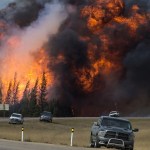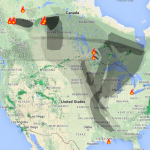Alberta
Four weeks after a wildfire began in the Canadian province of Alberta, thousands of structures in Fort McMurray have been destroyed, over 100,000 people have been evacuated, and 2200 square miles have gone up in smoke. The fire has also shut down commercial extraction of tar sands, a source of fossil fuel and the reason for Fort McMurray's prosperity. Greg Laden points out the perverse cause and effect of it all: tar sands contribute to global warming, global warming contributes to weather variation and drought, drought makes regions extra-vulnerable to wildfire, and wildfire shuts down tar…
The Climate Change Connection
It is hard to understand the connection between climate change and wild fire. This is in part because it is hard to understand the factors that determine the frequency and extent of wild fires to begin with, and partly because of the messiness of the conversation about climate change and fire. I'm going to try to make this simple, I don't expect to succeed, but maybe we can achieve a somewhat improved understanding.
Fires have to start, then they burn for a while, then they stop.
Most wild fires are probably started by humans. This does not mean that human…
The Canadian Province of Alberta has been likened to the American State of Texas. Energy and cattle, energy barons and cowboys. But with mountains.
Yesterday a relatively liberal party, the New Democratic Party (NDP), won a surprise victory in the provincial election, ousting the 44 year long reign of the Progressive Conservatives. From an American point of view, this is all very confusing because the Canadian political system is very different. Alberta has a Premier, and the premier will step down because of this election. The NDP formerly never held very many seats in the legislature,…


